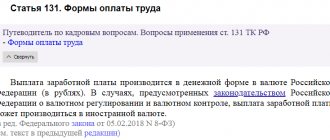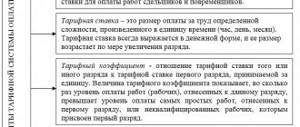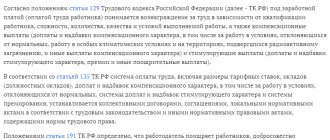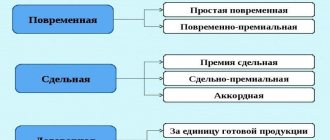Payment of wages is made in cash in the currency of the Russian Federation (in rubles). In accordance with a collective agreement or an employment contract, upon a written application from an employee, remuneration may be made in other forms that do not contradict the legislation of the Russian Federation and international treaties of the Russian Federation. The share of wages paid in non-monetary form cannot exceed 20 percent of the accrued monthly wage. Payment of wages in bonds, coupons, in the form of promissory notes, receipts, as well as in the form of alcoholic beverages, narcotic, poisonous, harmful and other toxic substances, weapons, ammunition and other items in respect of which prohibitions or restrictions on their free circulation are established , not allowed .
Russia is a world leader in non-cash payments: some statistics
We pay cashless in stores, pay for housing and communal services, taxes, and fees.
According to the Central Bank of Russia in 2021:
for the first half of the year, the number of non-cash payments is already almost 69%, and for the year the regulator predicts that they will completely exceed 70% (source).
During the pandemic, Russia entered the top 5 world leaders in terms of the rate at which the population abandoned cash in favor of non-cash payments (source).
Is it possible for an employee to receive wages in cash? Let's consider the current legislation and answer this question.
Forms of remuneration for an employee, the procedure for their establishment
In accordance with Part 1 of Art. 131 of the Labor Code of the Russian Federation, wages are paid in cash in the currency of the Russian Federation, that is, in rubles. Thus, the first form of remuneration for employees is the payment of wages in full in cash. Payment of all wages in cash is the general rule. Establishing this form of remuneration is possible by including an appropriate condition in the employment contract, as well as by actually paying all wages in rubles. That is, the monetary form of payment of all wages is ordinary, and therefore it does not require special documentation confirming the legality and validity of its use. The legality and validity of paying wages in the currency of the Russian Federation, that is, in rubles, directly follows from the content of Part 1 of Art. 131 Labor Code of the Russian Federation. Current legislation does not prohibit the payment of wages in other currencies circulating on the territory of the Russian Federation. However, to pay wages in another currency, an appropriate agreement must be concluded between the employer and employee. The presence of a written agreement on the use of currency to pay wages also allows us to talk about compliance with the monetary form of remuneration for the employee. However, an employee can at any time refuse to pay wages in another currency and demand that the employer switch to paying him for his work in rubles. The employer must satisfy this requirement. Thus, the monetary form of remuneration of employees means the payment of all wages in rubles or, by agreement with the employee, confirmed by his written application, in another currency circulating in the territory of the Russian Federation.
In Part 2 of Art. 131 of the Labor Code of the Russian Federation states that in accordance with a collective or labor agreement, upon the written application of an employee, remuneration may be made in other forms that do not contradict the legislation of the Russian Federation and international treaties of the Russian Federation. Consequently, wages may, in cases established by law and by agreement of the parties to the employment contract, be paid in non-monetary form. That is, it is possible to pay wages not in cash, but in property. Therefore, the second form is the payment of part of the salary in property form without using cash as payment. In accordance with Part 2 of Art. 131 of the Labor Code of the Russian Federation, the share of wages paid in non-monetary form cannot exceed 20 percent of the total amount of wages received by the employee. In Part 3 of Art. 131 of the Labor Code of the Russian Federation prohibits the payment of wages in the form of alcoholic beverages, narcotic, toxic, poisonous and harmful substances, weapons, ammunition and other items in respect of which prohibitions or restrictions on their free circulation have been established. Thus, items that are not freely usable in circulation cannot become property for the payment of wages in non-monetary form. The changes made to Part 3 of Art. 131 of the Labor Code of the Russian Federation, the list of funds prohibited for the use of payment of wages in non-monetary form has been supplemented with an indication of promissory notes, receipts, bonds, and coupons. Consequently, documents that are not recognized as a means of payment cannot be used to pay part of wages in non-monetary form. Property of real value can be used as a means of payment. Therefore, as a means of paying part of wages in non-monetary form, securities that the employee can sell can be used. Moreover, their value must be real, which means the possibility of their sale and the employee receiving an amount for them that cannot be less than the part of the salary replaced by securities.
When paying wages in kind, the requirements of ILO Convention No. 95 on the protection of wages must be taken into account. In Art. 4 of the said Convention states that partial payment of wages in kind is permitted in those industries and professions where such payment is common and desirable. For example, such payments have become common in agricultural production. The same norm of the Convention states the need to comply with the condition of the fairness and reasonableness of the cost of products and things transferred to the employee as wages.
In connection with the above, judicial practice proceeds from the fact that payment of wages in non-monetary form can be recognized as legal and justified if the following legally significant circumstances are proven. Firstly, the presence of the employee’s voluntary expression of will, confirmed by his written application, to receive wages in non-monetary form. The absence of a written application from an employee to receive wages in non-monetary form in the event of a dispute deprives the employer of the right to refer to witness testimony to confirm this expression of the employee’s will. At the same time, Art. 131 of the Labor Code of the Russian Federation does not exclude the right of an employee to express consent to receive part of the salary in non-monetary form, both for a specific payment and for a certain period, for example, a month, a quarter. If an employee has expressed a desire to receive part of his salary in non-monetary form for a certain period, then he is not deprived of the opportunity to refuse this form of payment before the expiration of this period by notifying the employer. Upon receipt of such notice, payment of wages in kind must cease and the employee must receive wages in cash.
Secondly, when applying this form of remuneration, payment of wages in non-monetary form must be proven in an amount not exceeding 20 percent of the total wages. Therefore, for each payment, the share of non-cash payments cannot exceed 20 percent of the total amount to be paid to the employee.
Third, it must be shown that payment of wages in kind is common and desirable in particular industries or occupations. That is, the employee can in this case use what he received in the form of payment for his labor for his own needs.
Fourthly, it must be proven that the payment of wages in kind is suitable for personal consumption of the employee and members of his family or benefits him, in particular can be used for activities outside working hours.
Fifthly, compliance with the prohibitions on the payment of wages in the form of alcoholic beverages, narcotic, toxic, poisonous and harmful substances, weapons, ammunition and other items in respect of which prohibitions or restrictions on their free circulation have been established, as well as in the form of promissory notes, receipts, bonds, coupons, that is, funds that have no material value and cannot be used as an equivalent to part of the employee’s salary, replaced by non-cash payments.
Sixthly, when paying wages to an employee in non-monetary form, the requirements of reasonableness and fairness must be met with respect to the cost of goods transferred to him as wages, that is, their value in any case should not exceed the level of prices prevailing for these goods in a given terrain. In addition, non-cash means of payment transferred to the employee as payment should not be less than the part of the salary that is replaced by these means.
At a minimum, these funds and the part of wages they replace in monetary terms must be equal to each other.
The lack of proof of each of the listed circumstances makes it possible to recognize the payment of part of the salary in non-monetary form as illegal and (or) unjustified.
However, from the contents of Part 2 of Art. 131 of the Labor Code of the Russian Federation, another legally significant circumstance follows, which must be proven when paying an employee wages in non-monetary form. Such a circumstance is the presence of a condition on the payment of wages in non-monetary form in a collective or employment agreement. The presence of this condition in at least one of the named employment contracts and the employee’s familiarization with it should be considered proof of the circumstance in question. The absence of such a condition in these contracts makes it possible to recognize the payment of wages in non-monetary form as illegal and unjustified. Although the presence of this condition in these labor contracts does not relieve the employer of the obligation to obtain the employee’s consent to pay wages in non-monetary form. The absence of such consent, expressed in writing, as well as the employee’s refusal to receive wages in non-monetary form upon the next payment, deprives the employer of the right to pay part of the wages in non-monetary form. Moreover, the receipt by an employee of part of the salary in non-monetary form, despite the proof of the listed circumstances, allows him to demand payment of this part in cash, since the payment of part of the salary in non-monetary form is an exception to the general rule of remuneration in rubles, which applies only if the listed circumstances are proven. After paying part of the salary in cash, the employer receives the right to claim from the employee the non-monetary funds transferred towards payment. When considering such claims from the employer, it should be taken into account that the employee is not to blame for the harm he suffered, since the payment of wages in non-monetary form was carried out by the employer himself in violation of the requirements of current legislation.
Thus, there are two forms of payment of wages: monetary form and non-monetary form. As a general rule, monetary forms of remuneration of employees are used. The non-monetary form of remuneration of employees is an exception to the general rule; this exception can be legally applied only if the legally significant circumstances considered by us are proven.
Textbook “Labor Law of Russia” Mironov V.I.
Employee's right to receive salary in cash
In accordance with Article 21 of the Labor Code of the Russian Federation, an employee has the right to
timely and full payment of wages.
At the same time, in Art. 136 of the Labor Code of the Russian Federation says:
Wages are paid to the employee, as a rule, at the place where he performs the work or transferred to the credit institution specified in the employee’s application, under the conditions determined by the collective agreement or employment contract.
The employee has the right to change the credit institution to which the wages should be transferred by notifying the employer in writing about the change in the details for transferring wages no later than fifteen calendar days before the day the wages are paid.
The place and timing of payment of wages in non-monetary form are determined by a collective agreement or employment contract. Wages are paid directly
to the employee
, except in cases
where another method of payment is provided for by federal law or an employment contract.
The above legal norms do not contradict Article 3 of Convention No. 95 of the International Labor Organization “Concerning the Protection of Wages”:
1. Wages paid in cash will be paid exclusively in legal money, and payment in the form of bills, bonds, coupons or any other form intended to replace legal money will be prohibited. 2. The competent authority may authorize or order the payment of wages by bank checks or postal orders if such form of payment is customary or is necessary in view of special circumstances and if a collective agreement or decision of an arbitration body so provides or, in the absence of such provisions, the worker concerned agrees on this.
Thus,
To answer the question of whether it is possible to receive a salary in cash, the employee must carefully read the collective and employment agreements.
If the contracts do not indicate that wages are paid only by wire transfer to a credit institution, then the employee has the right to demand payment of wages in cash.
Non-monetary salary – when and how can it be paid?
06March
It happens that, for one reason or another, the question arises in an organization: is it possible to give part of the wages to employees not in money, but, for example, in the company’s products or lunches? And if so, how to arrange it all?
First of all, yes, you can pay part of your salary not in money. Article 131 of the Labor Code of the Russian Federation (hereinafter referred to as the Labor Code of the Russian Federation), along with the usual monetary form of wages, also provides for “other forms,” including non-monetary (in kind). Payment in kind can be, in particular, the provision of meals or products from the agricultural and food industries. However, in order to take advantage of this opportunity, several important points must be taken into account.
- The possibility of such payment should be provided for by a collective or employment contract or an additional agreement to the employment contract, but not by a local regulatory act of the employer, for example, a regulation on remuneration.
- Such payment must be made upon a written application from the employee for the payment of part of his wages in kind. The application can be written both for payment of wages for a specific month, and for a specific period (for example, a quarter, a year). But even then, the employee has the right to refuse this option at any time, in agreement with the employer.
- The share of payment in kind (including VAT) cannot exceed 20% of the total amount of salary accrued for the month, including personal income tax. The calculation does not take into account the amount of sick leave, travel allowance and other payments that are not wages.
- The form in which non-monetary payments are made must not contradict Russian legislation and international treaties of the Russian Federation.
- Goods issued as wages must be suitable for personal consumption of the employee or members of his family (food, clothing, household items) or bring him some benefit. It is prohibited to issue salaries in bonds, coupons, in the form of promissory notes, as well as alcoholic beverages, narcotic, poisonous, harmful and other toxic substances and other goods prohibited or restricted in free circulation.
- The cost at which goods are transferred as wages (including VAT) must be reasonable, fair and not exceeding their local market value in the current payment period.
Thus, it turns out that the key points here will be the employee’s consent to such payments, the limitation on the share of payments in kind, as well as compliance with the law in relation to a number of goods with limited turnover. If you end up in court proceedings with an employee over the fact that you provided part of the payment in kind, then keep in mind that the court will also take into account how common or desirable such payment is for the given industry. type of economic activity or profession (subparagraph b, paragraph 54 of the Resolution of the Plenum of the Supreme Court of the Russian Federation dated March 17, 2004 No. 2 “On the application by the courts of the Russian Federation of the Labor Code of the Russian Federation”). For example, partial payment of wages in kind can be recognized as usual and desirable at catering, culinary, etc. enterprises. And in relation to members of production and agricultural cooperatives, this possibility is enshrined in Part 7 of Art. 40 of the Federal Law of December 8, 1995 No. 193-FZ “On Agricultural Cooperation”, Part 1 of Art. 19 of the Federal Law of 05/08/1996 No. 41-FZ “On Production Cooperatives”. Most often, the situation with payment of part of the salary “in kind” is used as a forced measure in a crisis or unstable financial situation, as well as when a company wants to reduce income tax by providing employees with food or when applying a simplified taxation system. By the way, it is best to formalize such forms of payment to employees as part of the salary, and not as social benefits. The fact is that it is the replacement of part of the salary with a natural product, including food, that allows, when calculating income tax within the framework of the general taxation system (GTS), as well as for the purpose of paying tax under the simplified taxation system (STS), to take into account the cost of lunches in expenses , but only within 20% of the accrued monthly salary (clauses 1, 4, 25, part 2, article 255, clause 25, article 270, subclause 6, clause 1, article 346.16 of the Tax Code of the Russian Federation, hereinafter referred to as the Tax Code RF). If the provision of lunches is provided as an additional condition of the employment contract, that is, not as remuneration, but as compensation for the cost of food as part of a social package, the organization will not be able to take such expenses into account for profit tax purposes and taxes when applying the simplified tax system. Salaries in kind are subject to personal income tax in the generally established manner on the market value of products, generally at a rate of 13%, and are also subject to insurance contributions in the generally established manner, since such payment is made within the framework of an employment relationship. In addition, the employer must remember that the operation of transferring goods (work, services) to employees as remuneration in kind is recognized as a sale, and their value is included in the VAT taxable base (subclause 1, clause 1, article 146, clause 2, Article 154 of the Tax Code of the Russian Federation) It turns out that there is no legal ban on paying part of wages in natural products. Moreover, this format may be beneficial to the organization, but it must be taken into account that the final word here will remain with the employee.








